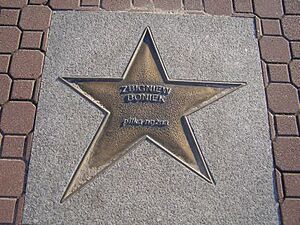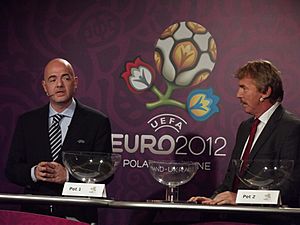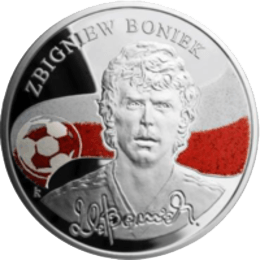Zbigniew Boniek facts for kids
Quick facts for kids
Zbigniew Boniek
|
||||||||||||||||||||||||||||||||||||||||||||||||||||||||||||||||||||||||||||||||||||||||||||||
|---|---|---|---|---|---|---|---|---|---|---|---|---|---|---|---|---|---|---|---|---|---|---|---|---|---|---|---|---|---|---|---|---|---|---|---|---|---|---|---|---|---|---|---|---|---|---|---|---|---|---|---|---|---|---|---|---|---|---|---|---|---|---|---|---|---|---|---|---|---|---|---|---|---|---|---|---|---|---|---|---|---|---|---|---|---|---|---|---|---|---|---|---|---|---|
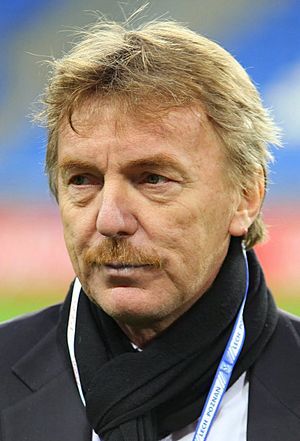
Boniek in 2015
|
||||||||||||||||||||||||||||||||||||||||||||||||||||||||||||||||||||||||||||||||||||||||||||||
| UEFA Vice President | ||||||||||||||||||||||||||||||||||||||||||||||||||||||||||||||||||||||||||||||||||||||||||||||
| In office 20 April 2021 – 3 April 2025 Serving with Armand Duka, David Gill, Gabriele Gravina and Laura McAllister
|
||||||||||||||||||||||||||||||||||||||||||||||||||||||||||||||||||||||||||||||||||||||||||||||
| President | Aleksander Čeferin | |||||||||||||||||||||||||||||||||||||||||||||||||||||||||||||||||||||||||||||||||||||||||||||
| Vice President | Karl-Erik Nilsson (as first vice-president) |
|||||||||||||||||||||||||||||||||||||||||||||||||||||||||||||||||||||||||||||||||||||||||||||
| 26th President of the PZPN | ||||||||||||||||||||||||||||||||||||||||||||||||||||||||||||||||||||||||||||||||||||||||||||||
| In office 26 October 2012 – 18 August 2021 |
||||||||||||||||||||||||||||||||||||||||||||||||||||||||||||||||||||||||||||||||||||||||||||||
| Preceded by | Grzegorz Lato | |||||||||||||||||||||||||||||||||||||||||||||||||||||||||||||||||||||||||||||||||||||||||||||
| Succeeded by | Cezary Kulesza | |||||||||||||||||||||||||||||||||||||||||||||||||||||||||||||||||||||||||||||||||||||||||||||
| Personal details | ||||||||||||||||||||||||||||||||||||||||||||||||||||||||||||||||||||||||||||||||||||||||||||||
| Born | 3 March 1956 Bydgoszcz, Poland |
|||||||||||||||||||||||||||||||||||||||||||||||||||||||||||||||||||||||||||||||||||||||||||||
| Height | 1.82 m (6 ft 0 in) | |||||||||||||||||||||||||||||||||||||||||||||||||||||||||||||||||||||||||||||||||||||||||||||
| Occupation |
|
|||||||||||||||||||||||||||||||||||||||||||||||||||||||||||||||||||||||||||||||||||||||||||||
|
Association football career
|
||||||||||||||||||||||||||||||||||||||||||||||||||||||||||||||||||||||||||||||||||||||||||||||
Zbigniew Boniek, born on March 3, 1956, is a famous Polish former football player. He also served as a vice-president for UEFA, which is the main football organization in Europe. He played as a midfielder, but could also play as a right winger or a second striker. Many people think he is one of Poland's best football players ever. Even the legendary Pelé chose him as one of the top 100 living footballers in 2004.
Boniek played 80 international matches for Poland, scoring 24 goals. He played in three FIFA World Cup tournaments in a row. He helped Poland win third place in the 1982 FIFA World Cup and was named to the tournament's best team. His biggest club successes were with Juventus in Italy. There, he won many important titles between 1983 and 1985. These included the Serie A league title, the Coppa Italia cup, the European Cup, the European Cup Winners' Cup, and the European Super Cup. He was the first Polish player to win a major European club title. He also won the Polish Footballer of the Year award in 1978 and 1982.
In the early 1990s, Boniek coached several Italian clubs. He also managed the Polish national team in 2002. In 2019, he was honored by being added to the Italian Football Hall of Fame.
Contents
Playing for Clubs
Boniek was born in Bydgoszcz, Poland. He started his football journey playing for Polish clubs. These included Zawisza Bydgoszcz and later Widzew Łódź.
Joining Juventus
In 1982, Boniek moved to Italy to play for the famous club Juventus. In his first season, he helped Juventus win the Coppa Italia. They also finished second in the league and reached the 1983 European Cup Final.
The next season, Boniek played a key role. Juventus won both the Serie A title and the Cup Winners' Cup in 1984. Boniek scored the winning goal in the 2–1 final match against Porto. Later that year, he helped them win the European Super Cup. He scored two goals in their 2–0 win against Liverpool.
In 1985, he won the European Cup with Juventus. They played against Liverpool again in the 1985 European Cup Final. Boniek won a penalty kick, which Michel Platini scored to win the title. However, this victory was overshadowed by the sad events of the Heysel Disaster.
Playing for Roma
After Juventus, Boniek joined Roma for the 1985–86 season. He won another Coppa Italia with Roma in 1986. He finished his professional playing career with Roma in 1988.
Playing for Poland
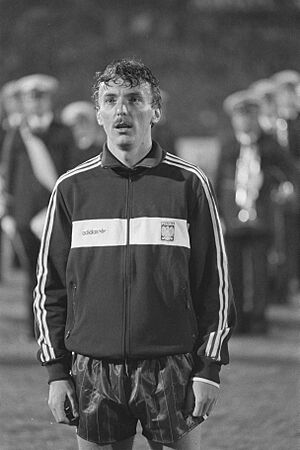
Boniek played for the Polish national team 80 times. He scored 24 goals between 1976 and 1988. He played in the 1978 FIFA World Cup, 1982 FIFA World Cup, and 1986 FIFA World Cup.
1978 World Cup
At the 1978 World Cup, Boniek started as a substitute. He scored two goals in a 3–1 win against Mexico. This helped Poland win their group. However, Poland was later knocked out in the second round.
1982 World Cup Success
Boniek was a star player for Poland at the 1982 FIFA World Cup in Spain. He helped his team reach the semi-finals. He scored four goals during the tournament. He scored in a 5–1 win over Peru. In the second round, he scored three goals (a hat-trick) in a 3–0 win against Belgium.
He missed the semi-final match against Italy because of a suspension. But he returned for the third-place match against France. Poland won this match, earning a bronze medal. Boniek was chosen for the tournament's best team.
1986 World Cup
The 1986 FIFA World Cup was not as successful for Poland. They made it to the second round but lost 4–0 to Brazil.
How Boniek Played
Boniek usually played as a midfielder. But he was also good at playing as a forward. He liked to play freely between different positions. He could play on either side of the field or in the middle. Throughout his career, he played as an attacking midfielder, a right winger, a playmaker, a central midfielder, a centre-forward, or a second striker.
Boniek was known for his unique mustache and outgoing personality. He was a tall, brave, and hard-working player. He was very fast and had quick reactions. He was especially good at making sudden runs to get past defenders. He often received long passes from his teammate Michel Platini. This made him very dangerous on counterattacks. Diego Maradona even called Boniek "one of the finest players of their generation."
Boniek was a very talented, creative, and skillful footballer. He was one of the best dribblers of his time. He also had great technique and flair. While he didn't score a huge number of goals, he was known for scoring important goals in big matches. He could finish well with either foot or his head.
Sometimes, he was criticized for not always being involved enough in the game. He also struggled against teams that didn't give him much space.
Gianni Agnelli, the Juventus president, nicknamed him Bello di notte ("Beauty at night"). This was because he played exceptionally well in European club matches, which were played in the evening. In these games, opponents often gave him more space. This allowed him to dribble, score goals, or create chances for his teammates with his passing and vision. The Italian press also called him Zibì.
Towards the end of his career, as he became slower, he sometimes played in a defensive role as a sweeper.
Coaching Career
After retiring as a player, Boniek became a coach. He coached several Italian clubs. These included Lecce (1990–91), Bari (1991–92), Sambenedettese (1992–93), and Avellino (1994–96).
He also served as a vice-president for the Polish Football Association. In July 2002, he became the manager of the Polish national team. He left the role in December 2002 after only five matches.
Life After Playing
After his playing career, Boniek had a successful business career. He also worked as a football expert and commentator.
In 2004, Pelé named Boniek as one of the 125 Greatest Living Footballers. This was part of FIFA's 100th anniversary celebrations. In 2009, he received the Golden Foot 'Legend' career award.
On October 26, 2012, he became the chairman of the Polish Football Association. He was known for supporting football fans and allowing things like pyrotechnics in stadiums. His time as chairman ended on August 18, 2021. Cezary Kulesza took over from him.
Personal Life
Boniek has a university degree in education. His father, Józef Boniek, was also a professional football player and later a manager. In 1976, Zbigniew married Wiesława. They have three children: two daughters named Karolina and Kamila, and a son named Tomasz.
Legacy and Recognition
A Honduran football player, Óscar Boniek García, was given the middle name Boniek to honor Zbigniew Boniek. García even chose to have "Boniek" written on the back of his jersey when he played for Houston.
In 2018, Boniek became an honorary citizen of Łódź, a city in Poland. In 2019, Forbes Polska magazine and Pentagon Research named him the most influential person in Polish sport. In the same year, he was voted into Poland's Team of the Century. This was part of a poll celebrating 100 years of the Polish Football Association.
In 2020, a book about Boniek called Zibi, czyli Boniek was published. Boniek also released his own autobiography that year, titled Zbigniew Boniek. Mecze mojego życia (Zbigniew Boniek: The Matches of My Life).
Career Statistics
Club
| Club | Season | League | Cup | Continental | Total | |||||
|---|---|---|---|---|---|---|---|---|---|---|
| Division | Apps | Goals | Apps | Goals | Apps | Goals | Apps | Goals | ||
| Widzew Łódź | 1975–76 | Ekstraklasa | 27 | 7 | 0 | 0 | 0 | 0 | 27 | 7 |
| 1976–77 | 24 | 9 | 1 | 0 | 0 | 0 | 25 | 9 | ||
| 1977–78 | 30 | 11 | 2 | 1 | 4 | 3 | 36 | 15 | ||
| 1978–79 | 28 | 4 | 1 | 1 | 0 | 0 | 29 | 5 | ||
| 1979–80 | 26 | 10 | 2 | 1 | 2 | 1 | 30 | 12 | ||
| 1980–81 | 11 | 1 | 0 | 0 | 5 | 0 | 16 | 1 | ||
| 1981–82 | 26 | 8 | 3 | 2 | 2 | 0 | 31 | 10 | ||
| Total | 172 | 50 | 9 | 5 | 13 | 4 | 194 | 59 | ||
| Juventus | 1982–83 | Serie A | 28 | 5 | 12 | 3 | 9 | 2 | 49 | 10 |
| 1983–84 | 27 | 3 | 6 | 2 | 9 | 4 | 42 | 9 | ||
| 1984–85 | 26 | 6 | 6 | 3 | 10 | 3 | 42 | 12 | ||
| Total | 81 | 14 | 24 | 8 | 28 | 9 | 133 | 31 | ||
| Roma | 1985–86 | Serie A | 29 | 7 | 5 | 1 | 0 | 0 | 34 | 8 |
| 1986–87 | 26 | 4 | 6 | 4 | 2 | 0 | 34 | 8 | ||
| 1987–88 | 21 | 6 | 3 | 1 | 0 | 0 | 24 | 7 | ||
| Total | 76 | 17 | 14 | 6 | 2 | 0 | 92 | 23 | ||
| Career total | 329 | 81 | 47 | 19 | 43 | 13 | 419 | 113 | ||
International
| National team | Year | Apps | Goals |
|---|---|---|---|
| Poland | 1976 | 6 | 2 |
| 1977 | 11 | 1 | |
| 1978 | 12 | 5 | |
| 1979 | 10 | 3 | |
| 1980 | 5 | 2 | |
| 1981 | 6 | 3 | |
| 1982 | 8 | 4 | |
| 1983 | 3 | 1 | |
| 1984 | 6 | 1 | |
| 1985 | 5 | 2 | |
| 1986 | 7 | 0 | |
| 1987 | 0 | 0 | |
| 1988 | 1 | 0 | |
| Total | 80 | 24 | |
International Goals
- Scores and results list Poland's goal tally first, score column indicates score after each Boniek goal.
| No. | Date | Venue | Opponent | Score | Result | Competition |
|---|---|---|---|---|---|---|
| 1 | 11 May 1976 | Basel, Switzerland | 1–2 | 1–2 | Friendly | |
| 2 | 31 October 1976 | Warsaw, Poland | 3–0 | 5–0 | 1978 FIFA World Cup qualification | |
| 3 | 19 June 1977 | São Paulo, Brazil | 1–3 | 1–3 | Friendly | |
| 4 | 5 April 1978 | Poznań, Poland | 5–0 | 5–2 | Friendly | |
| 5 | 12 April 1978 | Łódź, Poland | 1–0 | 3–0 | Friendly | |
| 6 | 10 June 1978 | Rosario, Argentina | 1–0 | 3–1 | 1978 FIFA World Cup | |
| 7 | 3–1 | |||||
| 8 | 15 November 1978 | Wrocław, Poland | 1–0 | 2–0 | UEFA Euro 1980 qualifying | |
| 9 | 18 April 1979 | Leipzig, East Germany | 1–0 | 1–2 | UEFA Euro 1980 qualifying | |
| 10 | 2 May 1979 | Chorzów, Poland | 1–0 | 2–0 | UEFA Euro 1980 qualifying | |
| 11 | 29 August 1979 | Warsaw, Poland | 3–0 | 3–0 | Friendly | |
| 12 | 13 May 1980 | Frankfurt, West Germany | 1–1 | 1–3 | Friendly | |
| 13 | 28 May 1980 | Poznań, Poland | 1–0 | 1–0 | Friendly | |
| 14 | 28 October 1981 | Buenos Aires, Argentina | 2–1 | 2–1 | Friendly | |
| 15 | 15 November 1981 | Wrocław, Poland | 6–0 | 6–0 | 1982 FIFA World Cup qualification | |
| 16 | 18 November 1981 | Łódź, Poland | 2–1 | 2–3 | Friendly | |
| 17 | 22 June 1982 | A Coruña, Spain | 3–0 | 5–1 | 1982 FIFA World Cup | |
| 18 | 28 June 1982 | Barcelona, Spain | 1–0 | 3–0 | 1982 FIFA World Cup | |
| 19 | 2–0 | |||||
| 20 | 3–0 | |||||
| 21 | 22 May 1983 | Chorzów, Poland | 1–0 | 1–1 | UEFA Euro 1984 qualifying | |
| 22 | 27 March 1984 | Zürich, Switzerland | 1–0 | 1–1 | Friendly | |
| 23 | 19 May 1985 | Athens, Greece | 3–1 | 4–1 | 1986 FIFA World Cup qualification | |
| 24 | 30 May 1985 | Tirana, Albania | 1–0 | 1–0 | 1986 FIFA World Cup qualification |
Awards and Honors
Boniek received many awards and honors throughout his career:
Club Trophies
- Widzew Łódź
- Ekstraklasa (Polish League): 1980–81, 1981–82
- Juventus
- Serie A (Italian League): 1983–84
- Coppa Italia (Italian Cup): 1982–83
- European Cup: 1984–85
- European Super Cup: 1984
- European Cup Winners' Cup: 1983–84
- Roma
- Coppa Italia (Italian Cup): 1985–86
International Achievements
- Poland
- FIFA World Cup third place: 1982
Individual Awards
- Polish Newcomer of the Year: 1976
- Piłka Nożna Polish Footballer of the Year: 1978, 1982
- Ballon d'Or third place: 1982
- FIFA World Cup All-star Team: 1982
- ADN Eastern European Footballer of the Season: 1982
- FIFA 100: 2004 (chosen by Pelé as one of the greatest living footballers)
- Golden Foot Legends Award: 2009
- FAI International Football Awards – International Personality: 2012
- Italian Football Hall of Fame: 2019
- Polish Football Association National Team of the Century: 1919–2019
Special Honors
- Knight's Cross of the Order of Polonia Restituta: 1982

- 3rd class knight of Order of Merit of the Italian Republic: 1997

See also
 In Spanish: Zbigniew Boniek para niños
In Spanish: Zbigniew Boniek para niños
 | Leon Lynch |
 | Milton P. Webster |
 | Ferdinand Smith |


